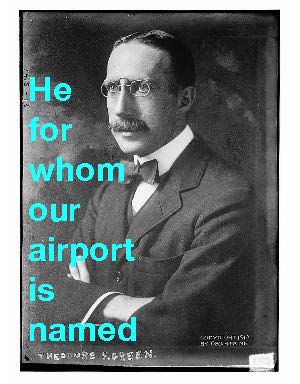… it’s not exercise.
Author: admin
The Beginning of the End of Elon Musk
Elon Musk’s “offer” to buy twitter was just another moment of thoughtless, grandiose stupidity. Musk quickly realized that owning and being responsible for twitter was a horrible fucking idea, so he wisely tried to back out. But here Musk encountered something he has never, ever had to deal with: a Delaware Chancery Judge.
Unlike the SEC, the rest of the U.S. government, and the owners/managers of all news media, Delaware Chancery Judges aren’t really scared of unlimited wealth backed up by total bullshit. They deal with it all the time. If it had been any other governmental institution, Elon Musk would have successfully–and very wisely–gotten out of buying twitter.
But the traditional Musk modes of high-powered bullshitting, pressuring, and outright threatening people and institutions don’t work with a Delaware Chancery Judge: the Big Boys are always playing in her sandbox, she knows they’re full of shit, so she follows the law (this does not make her a symbol of principled resistance to power–in these disputes, there are almost always Big Boys on both sides, so following the law simply makes things predictable and “fair” over the long run; it’s just what’s expected*).
Don’t believe whatever else you’ve heard: Musk wanted out of buying twitter, but his lawyers told him the Judge was going to force him to buy it anyway.
So Musk “repackaged” the deal, pretended the idea of going forward was his, and bit the bullet. And now he is fucked. twitter doesn’t make a profit, wasn’t about to make a profit, and the specifics have never been entirely clear on how “real” mega-profits could ever be made (in the dot-com era, this is not unusual: as long as a business has an established base of millions of avid users, Wall Street is willing to wait years before that business shows any meaningful profit).
But the mere fact of Musk’s takeover has destroyed the previously-accepted timeline–i.e., the timeline under which Wall Street, the financial media, and everyone else would let this “successful” company lose money for years. Under the old management, twitter probably had at least five more years before Wall Street et al. would actively desert/destroy its stock value because there was no “real” money being made.
Musk’s twitter will be expected to make money sooner, and it never, ever will. Like so many of his ilk, Elon Musk primarily runs the brand of “Elon Musk” and makes deals: he has never really run a company. Having started out rich & privileged, Musk’s present mega-wealth is based on being at the right place, at the right time, to buy and then sell out (PayPal, if you’re wondering). After the sell-out (i.e., the true cause & origin of his present mega-wealth), Musk bought things and played with his money. Tesla is other peoples’ creation/idea, and, under his management, is just bullshit (i.e., a ridiculously inflated and unjustified stock price) and government subsidies/support. SpaceX is all bullshit and government subsidies/support. The Boring Co., Starlink, and Neuralink are laughable monstrosities that will never make money (and, unlike Tesla and SpaceX, even Musk’s PR Deathstar can’t overwhelm the financial fanzines, e.g., Inc., Entrepreneur, Forbes, Wired, etc., into pretending these sillinesses are successful in any way).
Elon Musk was always doomed to become a joke. But this forced takeover of twitter will make his downfall into a real shitshow of epic proportions. As he gets more desperate, spinning out of control and out of money, Musk will lose control/management/ownership of Tesla and SpaceX.** If not, he’ll take them down with him. In any event, everyone is about to see the real Elon Musk. And it won’t be pretty.
_______________________________
*And now you know why the Delaware Chancery Court is the most important/impactful court for huge corporations in this country: no connected/powerful law firm, lobbyist(s), bought politician(s), media campaign or other big money move gives one side or the other a clear advantage when they battle there (unlike when they deal with all other state, local and national governmental institutions in this country). In other words, one can actually expect an outcome pretty much based on the law and the facts. Which is what doomed Musk into buying twitter.
**My bet is the real investors/members of the boards of Tesla and SpaceX are already meeting behind Musk’s back, planning how to isolate and protect those companies from Musk’s upcoming dumpster fire. Of course, when they make their move, the PR spin may cast it as an agreed-upon “transition” of “day-to-day control” as Musk “concentrates” on twitter or some other such bullshit, but it will be forced on Musk, just like the takeover of twitter was.
Also, Agincourt was bullshit
Speaking of Henry V, the myth of Agincourt is bullshit. Every armchair dilettante historian will always wax poetic about the glories of the English longbow and the virility of King Henry V but such ridiculousness belies the true nature of war … and the world.
Wars are never simply won by technology. And the world is never changed by the sole “great man.” These are convenient lies-simplifications to avoid the reality of our complex chaotic existence. Simplifications to justify the unjustified, unsupportable (over the long term), and immoral accrual of overwhelming socio-economic power in the hands of a tiny group of privileged males because they “earned” it, “deserve” it, and/or “made empires” through their own indomitable will to power. A laughable conceit, if not so destructive to all of humankind.
But I digress.
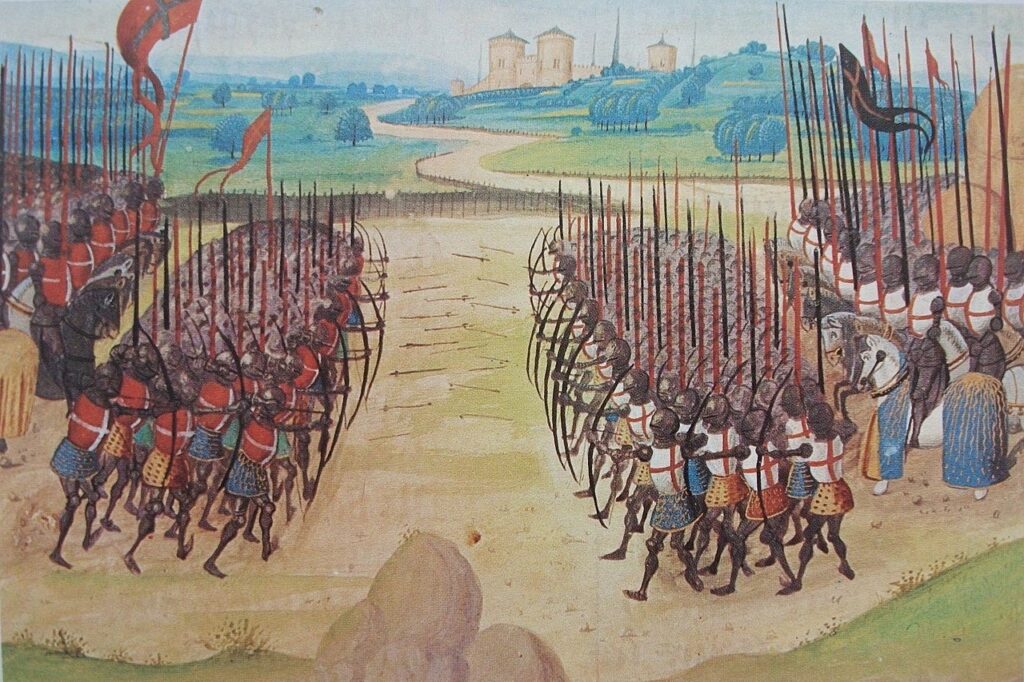
Chroniques d’Enguerrand de Monstrelet: en deux livres, avec pièces justificatives
While the longbow may have played a decisive role during one phase of the battle known as Agincourt (and in some ways during the Hundred Years War), the battle itself would be a historical footnote, like the resounding British victories on Long Island and Manhattan during the Revolutionary War, if not for factors completely unrelated to technology or Henry V’s leadership/martial skills. In other words, Henry V and his relatively small band would have inevitably been forced out of France regardless of Agincourt if the French had their shit together. Which they didn’t.
During this time, the French Civil War (1407-1435) divided what we now know as “France,” primarily between Burgundy and Armagnac. Screw the myth of English longbowmen, Henry faced only Armagnac forces, who were also already technically fighting Burgundian forces–and the Burgundian”French” troops happily sat by as the Armagnacs lost to Harry at Agincourt. At other times, the Burgundians actively provided aid to beleaguered English forces.
You see, if France was united, even if the English forces had somehow won Agincourt against both the Armagnacs and Burgundians, they would have inevitably lost the war/campaign.
Indeed, the moment the French Civil War ended (or, more accurately, when this particular phase of intra-French rivalry ended) and French forces united (Burgundy, Armagnac, etc.), there was no way England could keep any part of France over the long term (Ah, but Calais, … what of Calais? Go back to your armchair).
Despite this cold and stark reality, the (typically male) historian will repeat the childish rhetoric of the “strong” King Henry V who gained France and then his “weak” son King Henry VI who lost it (he was weak-minded, mind you, but that’s not the point). Utter bullshit. No English King could have maintained such a powerful foothold in a united France (=at least Burgundy+Armagnac).
Moreover, even at home, King Henry VI’s “weakness” was also beyond his control, as the internecine fighting between the so-called Yorkists (who at times controlled the town of Lancaster and not York) and the so-called Lancastrians (who at time controlled the city of York but not Lancaster) was also inevitable, although made very lively by an array of fascinating and capable characters (alas, poor Warwick the “kingmaker,” the Percys, the Nevilles, the Beauforts, the Baratheons, …). Moreover, in these “Wars of the Roses,” * the French played an important role in almost every decisive win by either side-another fact usually glossed over in the myth-making history of “Great Men.”
It’s impossible to reconcile a coherent and full understanding of real world facts with the predominant historical myths of “great” man determining the destinies of countries/wars through their own merit and brilliance, and/or “weak” leaders losing their countries/wars through their inherent “weaknesses,” “fatal flaws,” and/or “corrupt ways.” Utter bullshit. And incomprehensible as a belief system to anyone who reads and understands the facts of the historical record (vs. those read “biographies” of …. great men).
Yet this myth of the Great Man is alive and well today, and actively rotting away the foundations of our democracy, our economy, and actively sabotaging any rational attempts at planning for the future of humankind. But I guess it is helping to build our new “Republic,” our Grand Republic of privileged (mostly) white, (mostly) male Great Leaders. Huzzah!
______________________________________
* The name “Wars of the Roses” is an anachronism, as the English for hundreds of years called them simply the “civil wars.” The name “Wars of the Roses” didn’t gain use until the 1800’s, after Sir Walter Scott popularized the name in a novel (based on a pretty cool garden scene, Act 2, Sc. 4, in Shakespeare’s H6p2, which itself was written more than a 100 years after those civil wars). But you can easily prove me wrong by finding the phrase being actively used and understood by any populace anywhere before 1829. Please, go ahead.
Not that the white and red roses weren’t significant, but the truth is H7 magnified their significance in choosing his emblem of “reconciliation,” a combo of the red and white roses, as the Yorkist and Lancastrian forces had a number of symbols, emblems, and sigils over the course of those civil wars, and roses never figured highly among them (particularly as identifiers of own’s forces in battle).
H7’s, the Tudor rose of reconciliation, with Yorkist red somewhat more dominant even though H7 was a Lancastrian (a politically astute choice):

The White Rose of Lancaster (not so important as a visual representation of Lancastrian forces, particularly in battle, before the reconciliation):

The Red Rose of York (never so important as a visual representation of Lancastrian forces, particularly in battle, before the reconciliation):

Wha-huh? King Harry a dupe?
I was just re-watching the Henry V part of The Hollow Crown and was gobsmacked by the first scene, where the Archbishop of Canterbury plans to avoid taxes by convincing young King Harry to attack France.
Yeah, that’s what I said. I’ve watched/read this play multiple times and I didn’t remember that little chat.
This is no interpretation: the characters are quite clear–what matters most to them is stopping this bill (of new taxes on the Church); getting Henry V to attack France is simply the means to that end:
Ely. But, my good lord,
how now for mitigation of this bill
urged by the commons? Doth his majesty
Incline in it, or no?
Cant. He seems indifferent,
Or rather swaying more upon our part
… ;
For I have made an offer to his majesty,
…
As touching France, to give a greater sum
Than ever did at one time the clergy yet
Did to his predecessor’s part withal.
H5, Act 1, Sc. I, lines 69-81
Nice. Yes, I had forgotten that the first conversation in the play was between two people contriving to manipulate the young king into a war in order to avoid taxes. Moreover, while this reasoning is also in Holinshed,* Shakespeare reverses Holinshed in terms of the Tennis Ball Embassy, where the Dauphin mocks Henry by sending him a “treasure” of tennis balls, which happens in Holinshed before the Archbishop’s justification of war with France, not after, as in Shakespeare.
In all, this makes a joke of Henry’s seemingly wise and circumspect warning to the Archbishop below about the evils of war before the Archbishop attempts to justify a war with France.
[Yagottalove “our sleeping sword of war”-perhaps the title for a documentary about how the American public was misled into a war with Iraq?]For God doth know how many now in health
Shall drop their blood in approbation
Of what your reverence shall incite us to.
Therefore take heed how you impawn our person,
How you awake our sleeping sword of war;
We charge you in the name of God, take heed.
For never two such kingdoms did contend
Without much fall of blood, whose guiltless drops
Are every one a woe, a sore complaint
‘Gainst him whose wrongs gives edge unto the swords
That makes such waste in brief mortality.
H5, Act 1, Sc. II, lines 18-28
Yeah, good King Harry’s not about to just jump into a war with France, … just watch what happens next.
After the Archbishop’s lengthy justification speech, which Laurence Olivier’s movie version rightly portrays as completely incomprehensible (sometimes even to the Archbishop himself), the Dauphin’s ambassadors come on stage with their treasure of tennis balls. This insult is the last straw, so now Dirty Harry’s gonna cross the Channel and beat the shit out of the Dauphin and his country:
… I will dazzle all the eyes of France,
Yea, strike the dauphin blind to look on us.
And tell the pleasant prince this mock of his
Hath turned his balls to gunstones, and his soul
Shall stand sore chargèd for the wasteful vengeance
That shall fly with them: for many a thousand widows
shall this, his mock, mock out of their dear husbands,
Mock mothers from their sons, mock castles down,
H5, Act 1, Sc. II, lines 275-288
So all it takes is an Archbishop who wants to avoid taxes coinciding with a stupid and admittedly very unwise mocking practical joke (which, remember, happened in Holinshed before the Archbishop’s speech) to start a full-fledged war with another country across the English Channel?
[Yagottalove “mock castles down”-also a fine title for a book/short story/movie. About what? Misplaced rage? The rise of FoxNews?]Granted, Shakespeare’s audience would probably have no problem with any of this, and still venerate the “fighting” and “proud” King Henry depicted here. Who the hell cares about the particulars anyway? The man on the Tudor street held no illusions about the moral/ethical justification for war: that’s the King’s problem, we’re just the King’s subjects.** Besides, wasn’t Agincourt awesome?? Dude.
Still, it seems strange to bother even having it in there at all. Why? To be historically accurate? Leaving things out was never a problem for Shakespeare, never mind the fact his sources weren’t accurate in the first place.
But this particular reference would have some powerful overtones for Shakespeare’s audience. Some 60 years earlier Queen Elizabeth’s father Henry VIII had done far, far worse to the Church by essentially taking everything away. I’m not referring to making England a Protestant country, but rather the wholesale looting and destruction of monasteries, priories, friaries, and convents that followed (much of the loot of which Henry VIII did indeed use to prosecute his wars). Unlike the mythical and distant battle of Agincourt, the “dissolution of the monasteries” would be something still very much in the living memory of Shakespeare’s audience.
Frankly I don’t know how Shakespeare’s audience would hear this opening conversation, but I doubt they would have seen these prelates as the laughable fops portrayed in Olivier’s Henry V. At this point, anti-Catholic tensions were high, and this Archbishop of Canterbury may have been seen as a conniving, money-grubbing sonuvabitch using big fancy words and convoluted “learned” arguments to start a war so he could stay rich. Or perhaps the complete opposite–the opening chat being a subtle and sad foreshadowing of a much later King who ruthlessly took much more than mere “taxes” but some of the institutions themselves?
Or possibly both?
________________________________
* The events in many of Shakespeare’s history plays follow the Holinshed Chronicles. Indeed, sometimes Shakespeare uses the exact same descriptive phrases, such as here, where the Archbishop says the new tax intends to take “As much as would maintain, to the king’s honor / Full fifteen earls and fifteen hundred knights, / Six thousand and two hundred good esquires / And to relief of lazars and weak age / Of indigent faint souls past corporal toil, / A hundred almshouses, right well supplied; / And to the coffers of the king beside, / A thousand pounds by th’year.” Holinshed says the bill would “maintain, to the honor of the king and defense of the realm, fifteen earls, fifteen hundred knights, six thousand and two hundred esquires, and a hundred alms-houses for relief only of the poor, impotent, and needy persons, and the king to have clearly to his coffers twenty thousand pounds, … .” This is a very minor example, Shakespeare elsewhere lifts entire descriptive paragraphs from Holinshed.
** See, e.g., H5, Act IV, sc. 1, lines 131-134 (or Star Trek:TNG, S3E10, “The Defector,” as spoken by a disguised Patrick Stewart *not* playing Captain Picard, but rather playing the character Bates): “Ay, or more than we should seek after. For we know enough if we know we are the king’s subjects. If his cause be wrong, our obedience to the king wipes the crime of it out of us.”
As of 2:00PM, 26 July 2022, this blog looks like shit
Here’s hoping things get better.
My last site was stale and boring–does anyone think this site’ll be any different?
How weary, stale, flat, and unprofitable seem to me all the pages of this website!
Fie on’t, ah fie, ’tis an unweeded garden that grows to seed; things rank and gross in nature possess it merely.
That it should come to this!?!?! More than a decade old–nay, not so much–a poor player, that strutted and fretted its hour upon the web, and now should be heard of no more: it was a site made by an idiot, full of sound and fury, signifying nothing.
Building a new one: re-learning the coding, PHP, SQL, etc. With weird shit, like Shakespearean mash-ups and whatever the hell these are:

http://en.wikipedia.org/wiki/The_Treachery_of_Images
Old blog entry- Japanese Prints: Inventors under Adversity!!
These just tickle my fancy, mostly based on what I’m imagining they’re about. You can find them on the Library of Congress website, prints and photographs collection, and reading the notes, you will find they are Japanese woodcuts, dated “between 1850 and 1900,” donated by a Mrs. E. Crane Chadbourne to the Sackler Gallery of Art in 1930.
I imagine the prints to be part of the society-wide remaking of Japan before, during, and after the Meiji Restoration in 1868, when the Japanese “westernized” themselves with a vengeance. One of the prints has typewritten notes at the bottom, indicating that the “Department of Education” was somehow involved. These prints are the equivalent of medieval morality plays and Soviet posters from the 1920’s; they are proselytizing pieces of propaganda, intending to teach the viewer how to think about things. They were trying to create a new ethos. An “innovation nation” perhaps? Yes, but the real thing, not the pro-“entrepeneurship” schlock that seems to ooze from every corner of the corporate media machine nowadays.
What I find funny is that all of these Western inventors/innovators seem to be beseiged or a little crazy in every woodcut: are we really supposed to emulate them?
James Watt,
Inventor of the Steam Engine
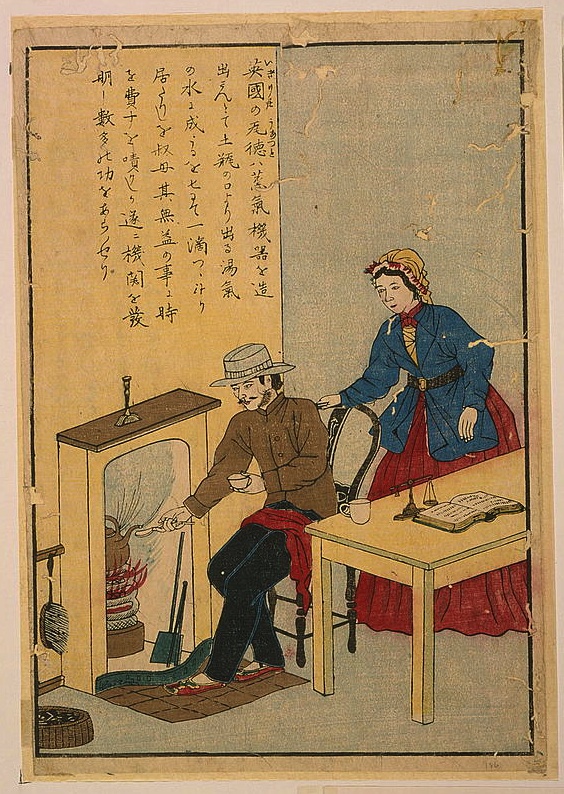
Bernard Palissy,
Inventor of Enamelled Pottery
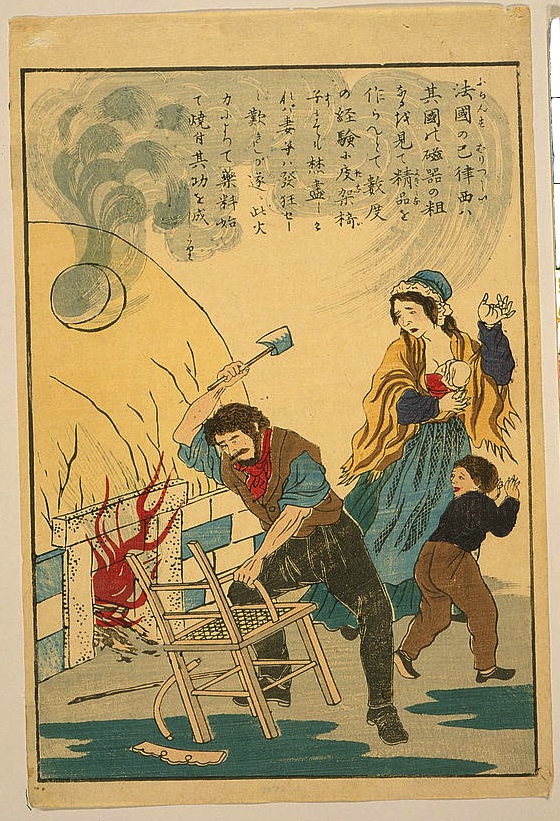
See Palissy’s Wikipedia entry:
At times he and his family were reduced to poverty; he burned his furniture and even, it is said, the floor boards of his house to feed the fires of his furnaces. Meanwhile, he endured the reproaches of his wife, who, with her little family clamouring for food, evidently regarded her husband’s endeavors as little short of insanity.
Richard Arkwright,
Inventor of Spinning Machiney
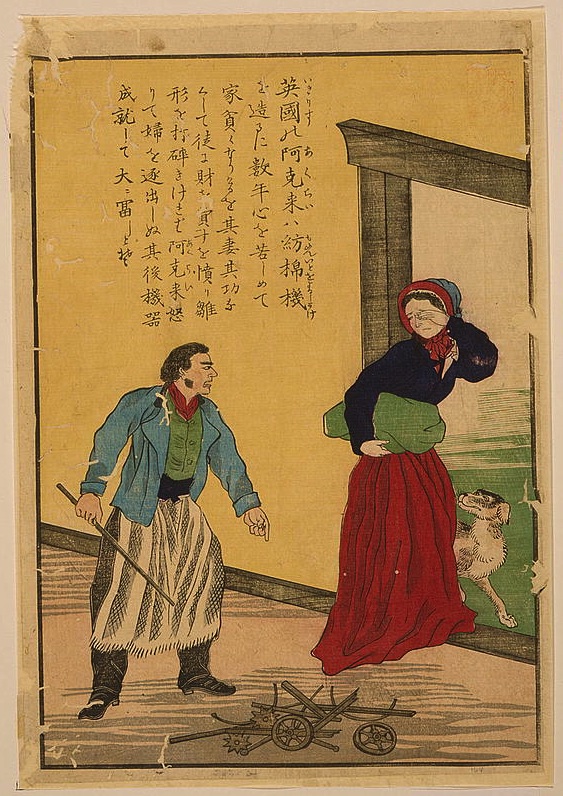
Thomas Carlyle,
Author and Historian
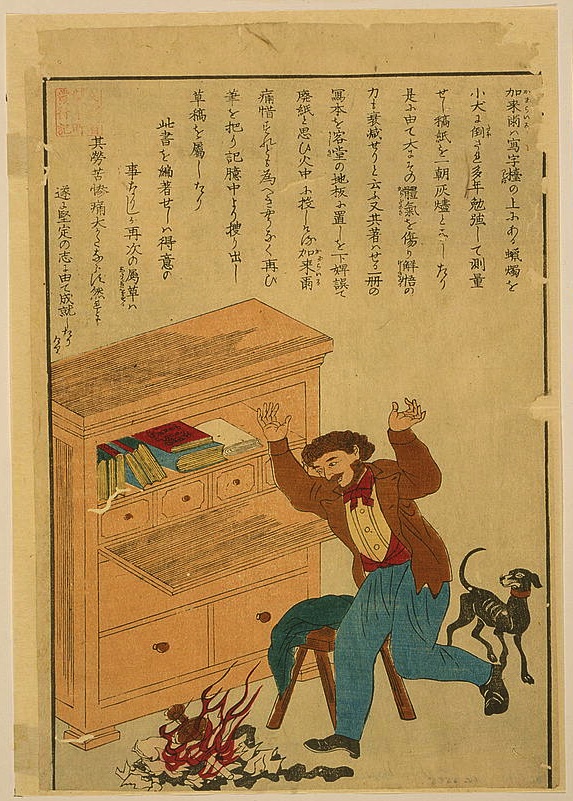
John James Audubon,
Bird Naturalist
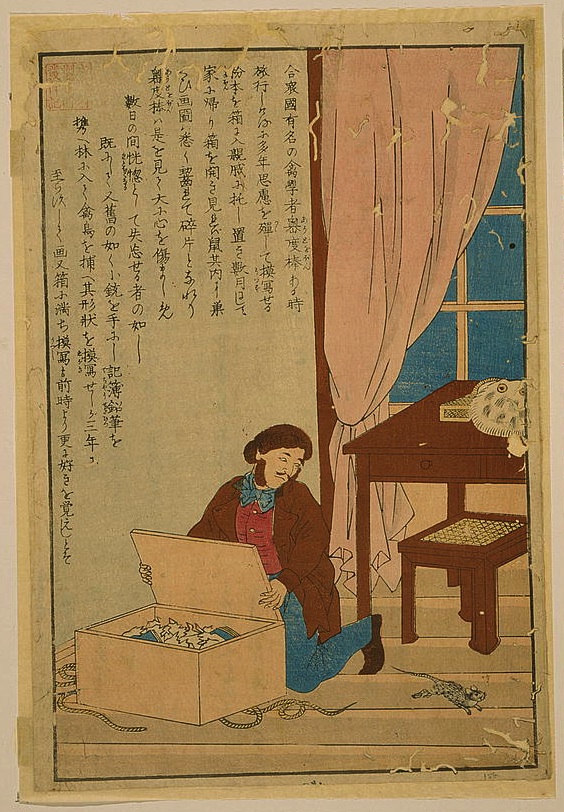
John Heathcoat,
Inventor of the Knitting Machine
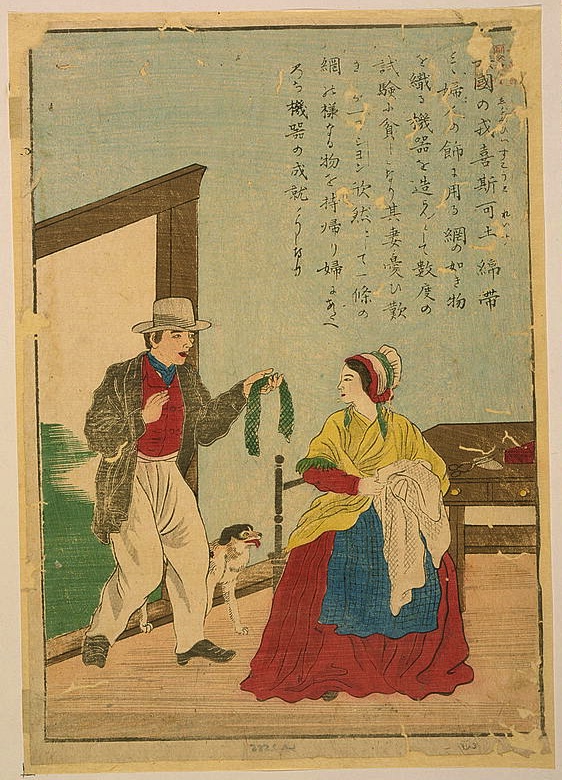
Hello world … again.
This is my second try with WordPress. Not expecting much.

